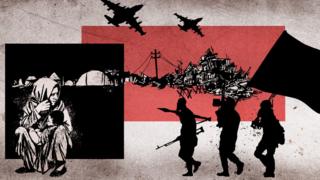Home » World News »
Syria: Who’s in control of Idlib?
The northern Syrian province of Idlib is the last remaining stronghold controlled by forces opposed to President Bashar al-Assad.
Syrian government forces, backed by their Russian allies, have stepped up bombardment of the rebel-held territory.
According to the UN, nearly 300 people have died in Idlib province and more than 300,000 people have been displaced since the escalation of violence in May.
Russia and Syria have accused groups controlling the area of violating the ceasefire agreement and carrying out attacks against civilians and military positions.
In September last year, Russia, Turkey and Iran agreed to extend a ceasefire across north-west Syria and impose a 30km (18.6 mile) buffer zone between opposing forces.
Who controls Idlib?
Idlib has been controlled by a number of rival factions, rather than a single group, since it fell to the opposition in 2015.
The main armed groups operating there are:
In January 2019, Hayat Tahrir al-Sham (HTS), an alliance of jihadists groups, launched a large-scale offensive against rival rebel groups in the area.
HTS has now become one of the strongest militant groups in northern Syria. It largely controls Idlib province, including the provincial capital and the border crossing with Turkey at Bab al-Hawa.
HTS is the latest incarnation of al-Nusra Front, which was al-Qaeda’s official affiliate in Syria.
In 2016, al-Nusra Front declared that it had severed formal ties with the al-Qaeda network and renamed itself Jabhat Fateh al-Sham.
The following year, it merged with several small jihadist groups fighting in Syria and formed HTS.
Although HTS insists it is independent and not linked to an external entity, the UN, US and Turkey consider it a group associated with al-Qaeda and list it as a terrorist organisation.
Although independent analysts are cautious about making estimates, Charles Lister, of the US-based Middle East Institute, says he believes HTS has roughly 15,000 full-time fighters, and several thousand more civilian employees.
“Beyond HTS, Idlib is also home to at least a dozen other jihadist groups, most of whom remain more openly loyal to al-Qaeda – they probably command a rough total of 7,500 more men at arms,” he says.
The top US general is reported to have estimated that there were 20,000 to 30,000 militants in Idlib, while the UN – in a report published in January – estimated there were 20,000 fighters in Idlib associated with HTS, including many foreigners.
Syrian government supporters say the numbers are significantly higher.
Pro-government MP, Fares Shehabi, told BBC Reality Check that currently there are as many as 100,000 HTS fighters in Idlib.
He believes HTS is affiliated to al-Qaeda despite its denials. “They carry al-Qaeda flags, they practise al-Qaeda methods,” he said
Other groups
The other significant force is the National Liberation Front (NLF), which was formed in 2018 by rebel factions wanting to counter HTS.
It is a Turkish-backed alliance that includes hardline Islamist groups like Ahrar al-Sham, as well as several groups fighting under the banner of the Free Syrian Army – a force considered more “moderate” by Western powers.
Earlier this year, NLF lost most of the area under its control in northern Syria to HTS after fighting broke out between the two groups. NLF reached an agreement recognising the HTS-backed administration, and since then the two groups have been fighting together against recent Syrian government assaults.
Aron Lund, a fellow with the US-based research group The Century Foundation, says the NLF is held together by Turkish leadership, as well as Turkish money, weapons and supplies.
“The NLF will stand or fall with Turkey’s involvement in Syria,” he says.
There are other groups as well.
One is Hurras al-Din (Guardians of Religion), a splinter group from HTS that is widely believed to be al-Qaeda’s new affiliate in Syria.
Hurras al-Din is largely made up of HTS defectors and the two groups have so far found it difficult to set aside their differences and work together beyond occasional, limited collaboration.
Foreign militants
There are also many foreign jihadists in Idlib, many of whom are fighting for groups associated with al-Qaeda.
The Turkistan Islamic Party (TIP) is a group of Uighur fighters, who mostly fight alongside HTS.
The Uighurs – a Muslim ethnic minority primarily based in China’s Xinjiang province – established a presence in northern Syria in the early years of the civil war.
There are also the predominantly-Uzbek Tawhid and Jihad Brigade, which is aligned with HTS, and the Imam al-Bukhari Brigade.
“We believe there are about 30-40,000 foreign fighters mainly Uighur, Tajik, Uzbek, Turks, and others from 103 nationalities – many with their migrated families,” says Syrian MP Fares Shehabi.
But Raffaello Pantucci, of the UK-based security think tank the Royal United Services Institute, believes this number is too high.
“They and their families may not number more than several thousand,” he says.
There are also believed to be other foreign jihadists in Idlib, including Chechens and Uzbeks, although the numbers are likely to be smaller.
Civilians trapped in Idlib
A major concern now is for the civilians living in Idlib.
The UN estimates it is home to 3 million people, including 1 million children.
More than 40% of these come from other areas previously held by opposition forces.
UN officials say as many as 800,000 people could be displaced by a full-scale offensive on the province, and that the number of people needing aid in Syria – currently two million – could increase dramatically.
Read more from Reality Check
Send us your questions
Follow us on Twitter
Source: Read Full Article



